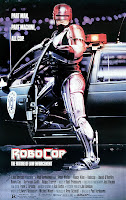There is a moment early in the film when a robot behaves uncontrollably. It has been programmed to warn a criminal to drop his gun, and then shoot him if he doesn’t listen. The robot, which the late Roger Ebert describes as “an ugly and ungainly machine,” is wheeled into a board meeting of the company that hopes to make millions by selling it. A junior executive is picked to pull a gun on the robot. The robot gives the warning. The executive drops the gun. The robot repeats the warning, counts to five, and shoots the executive dead.
This is a very funny scene. (Whether it was even funnier before the MPAA Code and Ratings Administration demanded it to be re-edited, I think, is a debatable question). Ebert then says, “It is funny in the same way that the assembly line in Charlie Chaplin's "Modern Times" is funny - because there is something hilarious about logic applied to a situation where it is not relevant.”
Because the scene surprises us in a movie that looked as if it was becoming a serious thriller, it throws us off guard. We’re no longer 100% sure where “RoboCop” is going, and that’s one of the movie’s strong areas.
The film takes place at an unknown time in the future in Detroit, a city where gangs have increased. There have been several cops killed. A big corporation wants to put robot cops on the market, but the demonstrator prototype is obviously not the one to be taken in for the job.
A junior scientist, played by Miguel Ferrer, thinks he knows a better way to make a policeman, by combining robotics with a human brain. He gets his chance when Officer Alex Murphy, played by the great Peter Weller, is killed in the line of duty. Ok, not quite killed. There is a part of him that remains alive, and around that the first “RoboCop” is constructed – a half-man, half-machine that works with the perfect logic except for the scraps of human naturalness and instinct that may be waiting somewhere in the back of his memory.
Nancy Allen co-stars in the movie as Anne Lewis, Murphy’s partner before he was shot. She recognizes something familiar about RoboCop and eventually realizes what it is: Inside that titanium steel suit, it’s Murphy. In actuality, it shouldn’t have taken her this long to figure it all out, since Murphy’s original nose, mouth, chin and jaw are clearly visible. His inventor must have been a fan of Batman and Robin in the case that if you can’t see the eyes of someone you know, you’ll never recognize him.
The broad outline of the plot develops along more or less the lines of a standard thriller. But this is not a standard thriller. The director is Dutchman, Paul Verhoeven, who directed “Soldier of Orange” and “The Fourth Man.” You won’t be able to categorize his movies easily. This movie has comedy and slapstick comedy. There is romance. There is a large amount of philosophy, mainly focusing on the question, “What is a man?” In addition, there is political social satire, as the Robocop takes on some qualities and, as Ebert puts it, “some of the popular following of a Bernhard Goetz.”
Oddly enough, a lot of RoboCop’s personality is expressed by his bass-baritone voice, which is a mechanical monotone. Machines and robots have spoken exactly like that for years in cinema, and now life is beginning to mock them. Ebert confesses, “I was in the Atlanta airport a few weeks ago, boarding the shuttle train to the terminal, and the train started talking just like robocop, in an uninflected monotone. ("Your-attention-please-the-doors-are-about-to-close.")”
Ebert laughed at that, but no one else did. He says, “Since the recorded message obviously could have been recorded in a normal human voice, the purpose of the robotic audio style was clear: to make the commands seem to emanate from a pre-programmed authority that could not be appealed to.” In “RoboCop” Verhoeven and Weller get a lot of stuff out of the conflict between the completely solid voice and the increasingly confused person behind it.
Considering that he spends a good majority of the movie behind that robotic helmet, Weller does an outstanding job of creating sympathy for his character. He is more “human,” obviously, when he is RoboCop than before he became when he was an ordinary human being. His difficulty is appealing, and Nancy Allen is effective as the determined partner who wants to find out what really happened to him.
Most thriller and special-effects movies come right off the assembly line. You can call out every development ahead of time, and you’re usually right. “RoboCop” is a thriller with a difference.
If you haven’t seen this movie, what are you waiting for? Go out and see it. You’ll absolutely love it. I agree with James Rolfe, it’s one of the best shoot-‘em up movies ever made.
Stay tuned for next week when I continue “RoboCop” month.

No comments:
Post a Comment